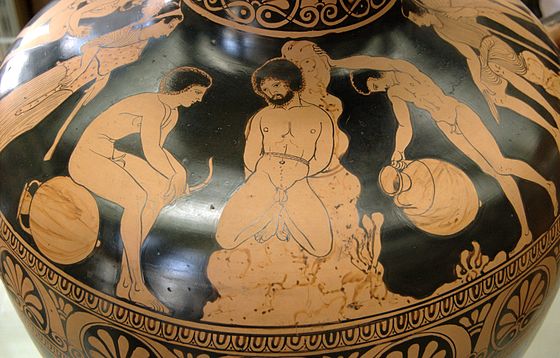
The Amycos is a satyr play by the 5th century BCE Athenian playwright Sophocles.

The Amycos is a satyr play by the 5th century BCE Athenian playwright Sophocles.
This satyr play almost certainly told the story of the Argonauts and their encounter with Amycus, an inhospitable king in Bithynia, who would challenge travellers to a boxing match before allowing them to draw water for their ships, and invariably killed his opponents. [1] However, upon landing, Polydeuces promptly challenged and defeated the king, and depending on the author, the Argonaut then either killed Amycos [2] or made him swear an oath on his life that he would no longer “maltreat strangers”. [3] [4] [5] Jebb believes another ending, which was related by Periander, [6] wherein Amycos was put in chains, would have been more suitable for a satyr play; unfortunately, it is impossible to say for certain which of these endings was used by Sophocles [7]
Unfortunately, no date more precise than the 5th century BC can as yet be reliably ascribed to the writing or production of the play.
Fragments of the Amycos by Sophocles are only found in Athenaeus, Deipnosophists 9, 400B

Sophocles is one of three ancient Greek tragedians whose plays have survived. His first plays were written later than or contemporary with those of Aeschylus, and earlier than or contemporary with those of Euripides. Sophocles wrote over 120 plays during the course of his life, but only seven have survived in a complete form: Ajax, Antigone, Women of Trachis, Oedipus Rex, Electra, Philoctetes and Oedipus at Colonus. For almost 50 years, Sophocles was the most celebrated playwright in the dramatic competitions of the city-state of Athens that took place during the religious festivals of the Lenaea and the Dionysia. He competed in 30 competitions, won 24, and was never judged lower than second place. Aeschylus won 13 competitions, and was sometimes defeated by Sophocles, while Euripides won four competitions.

In Greek mythology, Achelous was originally the god of all water and the rivers of the world were viewed by many as his sinews. Later, in Hellenistic times, he was mostly relegated to the Achelous River, which is the largest river of Greece, every river having its own river spirit.

In Greek mythology, Phineus was a king of Salmydessus in Thrace and seer who appears in accounts of the Argonauts' voyage. Some accounts make him a king in Paphlagonia or in Arcadia.

In Greek mythology, Telephus was the son of Heracles and Auge, who was the daughter of king Aleus of Tegea. He was adopted by Teuthras, the king of Mysia, in Asia Minor, whom he succeeded as king. Telephus was wounded by Achilles when the Achaeans came to his kingdom on their way to sack Troy and bring Helen back to Sparta, and later healed by Achilles. He was the father of Eurypylus, who fought alongside the Trojans against the Greeks in the Trojan War. Telephus' story was popular in ancient Greek and Roman iconography and tragedy. Telephus' name and mythology were possibly derived from the Hittite god Telepinu.
In Greek mythology, Catreus or Katreus was the eldest son of Minos and Pasiphaë, and Minos' successor as king of Crete. Catreus had one son, Althaemenes, and three daughters, Apemosyne, Aerope and Clymene. Catreus was mistakenly killed by his son Althaemenes thereby fulfilling an oracle.
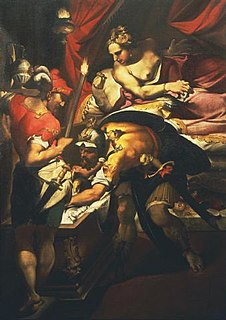
In Greek mythology, Aërope was a daughter of Catreus, the king of Crete, and sister to Clymene, Apemosyne and Althaemenes. She was the wife of Atreus, and by most accounts the mother of Agamemnon and Menelaus.
In Greek mythology, Rhodos/Rhodus or Rhode, was the goddess and personification of the island of Rhodes and a wife of the sun god Helios. The poet Pindar tells the story, that when the gods drew lots for the places of the earth, Helios being absent received nothing. So Helios, with Zeus' consent, claimed a new island (Rhodes), which had not yet risen from the sea. And after it rose from the sea he lay with her and produced seven sons.
Apollonius of Rhodes was an ancient Greek author, best known for the Argonautica, an epic poem about Jason and the Argonauts and their quest for the Golden Fleece. The poem is one of the few extant examples of the epic genre and it was both innovative and influential, providing Ptolemaic Egypt with a "cultural mnemonic" or national "archive of images", and offering the Latin poets Virgil and Gaius Valerius Flaccus a model for their own epics. His other poems, which survive only in small fragments, concerned the beginnings or foundations of cities, such as Alexandria and Cnidus places of interest to the Ptolemies, whom he served as a scholar and librarian at the Library of Alexandria. A literary dispute with Callimachus, another Alexandrian librarian/poet, is a topic much discussed by modern scholars since it is thought to give some insight into their poetry, although there is very little evidence that there ever was such a dispute between the two men. In fact almost nothing at all is known about Apollonius and even his connection with Rhodes is a matter for speculation. Once considered a mere imitator of Homer, and therefore a failure as a poet, his reputation has been enhanced by recent studies, with an emphasis on the special characteristics of Hellenistic poets as scholarly heirs of a long literary tradition writing at a unique time in history.
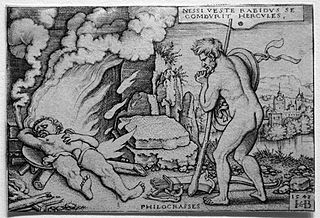
Women of Trachis or The Trachiniae is an Athenian tragedy by Sophocles.
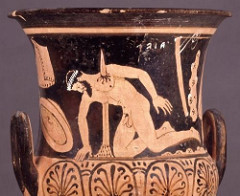
Sophocles' Ajax, or Aias, is a Greek tragedy written in the 5th century BCE. Ajax may be the earliest of Sophocles' seven tragedies to have survived, though it is probable that he had been composing plays for a quarter of a century already when it was first staged. It appears to belong to the same period as his Antigone, which was probably performed in 442 or 441 BCE, when he was 55 years old. The play depicts the fate of the warrior Ajax, after the events of the Iliad but before the end of the Trojan War.
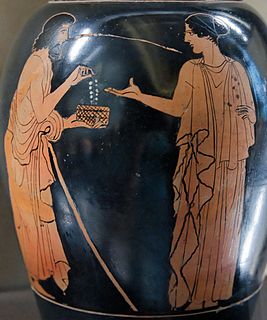
The Epigoni is an ancient Greek tragedy written by the Greek playwright Sophocles in the 5th century BC and based on Greek mythology.
In Greek mythology, Nauplius is the name of one mariner heroes. Whether these should be considered to be the same person, or two or possibly three distinct persons, is not entirely clear. The most famous Nauplius, was the father of Palamedes, called Nauplius the Wrecker, because he caused the Greek fleet, sailing home from the Trojan War, to shipwreck, in revenge for the unjust killing of Palamedes. This Nauplius was also involved in the stories of Aerope, the mother of Agamemnon and Menelaus, and Auge, the mother of Telephus. The mythographer Apollodorus says he was the same as the Nauplius who was the son of Poseidon and Amymone. Nauplius was also the name of one of the Argonauts, and although Apollonius of Rhodes made the Argonaut a direct descendant of the son of Poseidon, the Roman mythographer Hyginus makes them the same person. However, no surviving ancient source identifies the Argonaut with the father of Palamedes.

The Ichneutae, also known as the Searchers, Trackers or Tracking Satyrs, is a fragmentary satyr play by the fifth-century BC Athenian dramatist Sophocles. Three nondescript quotations in ancient authors were all that was known of the play until 1912, when the extensive remains of a second-century CE papyrus roll of the Ichneutae were published among the Oxyrhynchus Papyri. With more than four hundred lines surviving in their entirety or in part, the Ichneutae is now the best preserved ancient satyr play after Euripides' Cyclops, the only fully extant example of the genre.
In Greek mythology, Lynceus was a Messenian prince and one of the Argonauts who served as a lookout on the Argo. He also participated in the hunt for the Calydonian Boar.
In Greek mythology, Aleus was the king of Arcadia, eponym of Alea, and founder of the cult of Athena Alea. He was the grandson of Arcas. His daughter Auge was the mother of the hero Telephus, by Heracles. His sons Amphidamas and Cepheus, and his grandson Ancaeus were Argonauts. Ancaeus was killed by the Calydonian boar.
Alfred Chilton Pearson was an English classical scholar, noted for his work on Greek tragedy.
Amphiaraus is a lost Greek play by the Athenian poet Sophocles. It is believed to have been a satyr play, although it is not clear which incident pertaining to the title character was the subject of the play, nor even which incident would lend itself to satyr play treatment.
The Aithiopes is a tragedy by the 5th century BCE Athenian playwright Sophocles that survives only in fragments.
The Akrisios is a tragedy by the 5th-century BCE Athenian playwright Sophocles that survives only in fragments.
In Greek mythology, Idaea or Idaia was, by some accounts, the daughter of the Scythian king Dardanus, and the second wife of Phineus, the king of Thrace. Idaea's false accusations against her stepsons, were responsible for her husbands misfortunes. She was sent back to Scythia, where she was condemned to death. Other ancient sources give other names for Phineus's second wife, including: Eidothea, sister of Cadmus, and Eurytia.